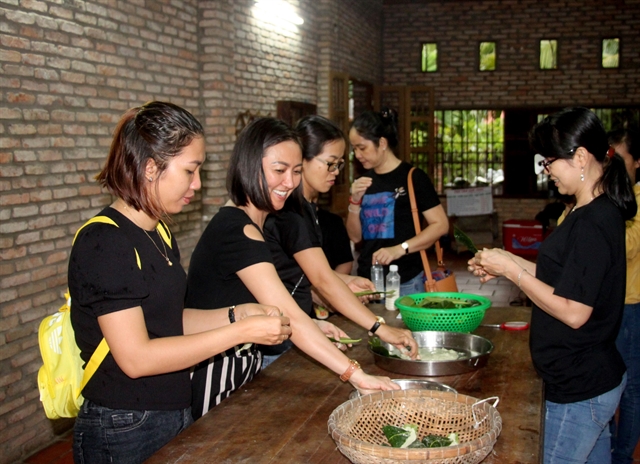 Life & Style
Life & Style


|
| Visitors learn how to make regional traditional cakes at Út Trinh Homestay in Long Hồ District in Vĩnh Long Province. — VNA/VNS Photo by Lê Thúy Hằng |
VĨNH LONG — The Cửu Long (Mekong) Delta province of Vĩnh Long's Department of Culture, Sports and Tourism has released safe tourism criteria to ensure control and prevention of COVID-19.
Tourist agencies must strictly follow the Ministry of Health’s 5K messages to wear masks, frequently disinfect hands, keep a safe distance, refrain from gatherings, and make health declarations to all visitors.
The department has also encouraged tourist agencies and tourism service suppliers to offer new promotions.
Nguyễn Trọng Tín, head of the tourism management office of the department, said the province has asked every tourism business to implement safety criteria, and regularly self-assess COVID-19 prevention and control requirements.
The businesses must monitor customers’ daily health and notify medical facilities and local authorities when detecting a suspected case of SARS-CoV-2 infection.
The department has sent a group of investigators to check the COVID-19 prevention and control measures at accommodations, tourism areas and service suppliers. Measures include temperature measuring devices, medical masks, hand sanitisers and health declaration.
Vĩnh Long is known for special tourism products in four groups: homestays and ecological tours to fruit gardens, tours to understand local cultural figures, agriculture tours, and tours to handicraft villages.
The province now has nearly 100 homestays, guesthouses and hotels and 40 tourism areas, mostly located in Long Hồ District.
It has 25 standard homestays, two of which reached the ASEAN homestay standard in the 2017-2019 and 2019-2021 periods.
With a dense system of canals and rivers and rich gardens of tropical fruits, the province has 50 gardens offering snacks, meals and fruits like custard apple, dragon fruit, grapefruit and rambutan.
It also hosts 44 provincial level historical-cultural sites and 11 national level sites, and 25 handicraft villages making rattanware, leaf weaving, rice crepes, ceramics, and forging metals.
Phạm Thị Ngọc Trinh, owner of Út Trinh Homestay in Long Hồ District, said the homestay has several activities interacting with local culture to attract more visitors after the effects of COVID-19.
The homestay offers cooking classes of special dishes in the region, traditional games, and tours to handicraft villages that attract a large number of visitors every weekend.
The facility is also organising classical drama shows, allowing tourists to enjoy the performance and meet with artists and learn how to act and do make-up for a performance.
Trinh said although the homestay welcomes a large number of visitors on weekends and holidays, they take all preventive measures.
According to the province’s Department of Culture, Sports and Tourism, Vĩnh Long’s tourism sector has revived this year despite facing difficulties caused by COVID-19.
The number of visitors reached more than 240,000 in the first four months of this year, including 9,000 visitors during the Reunification Day and International Labour Day holiday from April 30 to May 3.
The tourism sector earned around VNĐ122 billion (US$5.25 million), including VNĐ5.6 billion ($240,800) from the holiday. — VNS




